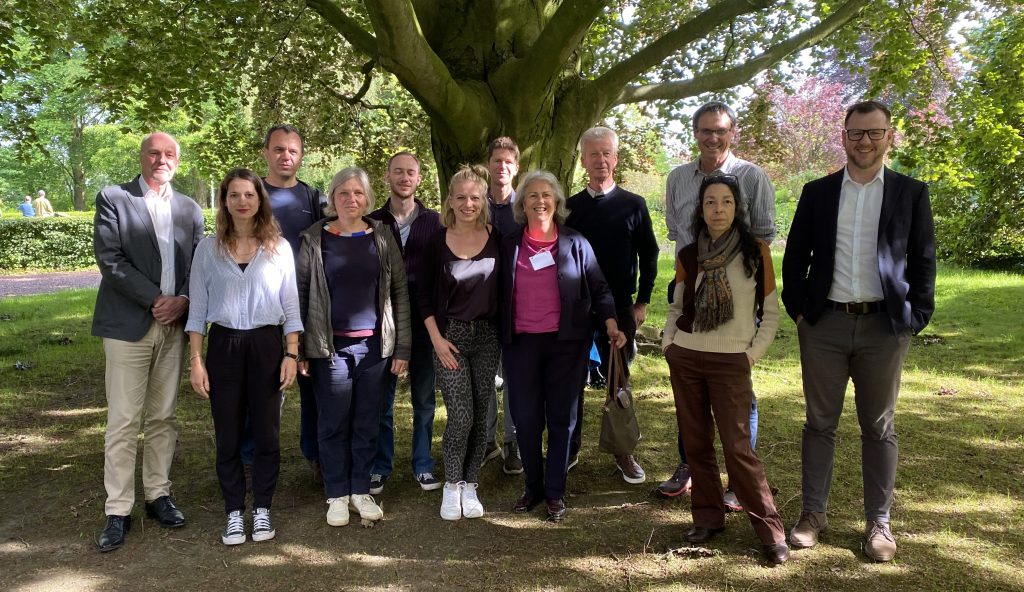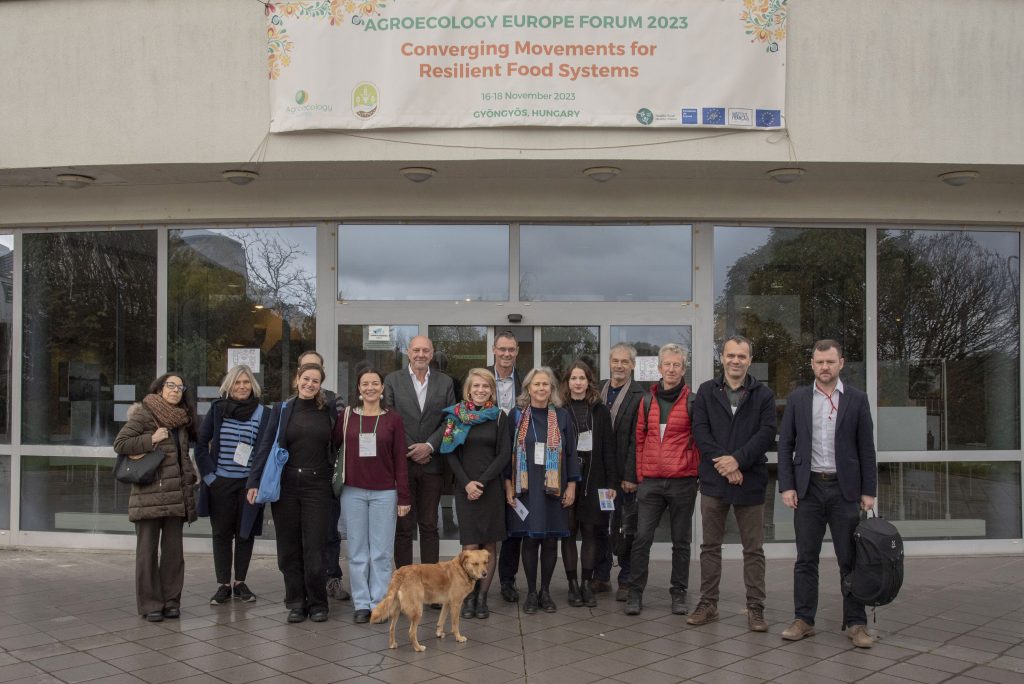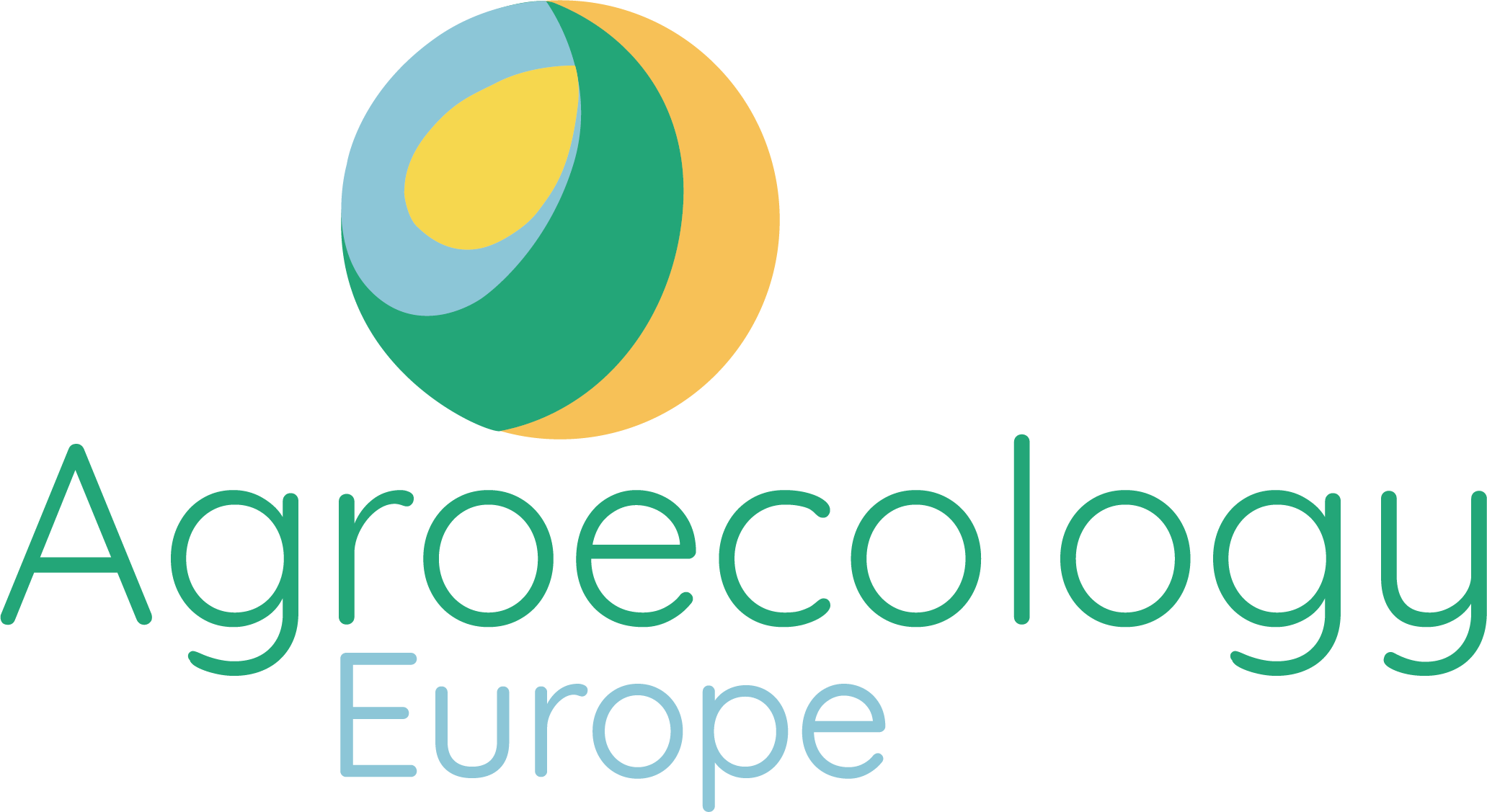Board of Directors 2022-2026

“Agroecology offers the most promising alternatives to stop the decline of biodiversity and family farming and fight against climate change.
Together, we mobilise alongside farmers and civil society organisations to create a momentum for agroecology in Europe!”
Following the General Assembly held on 17 November 2021 and the election of the new Board of Directors, and in accordance with the statutes approved on the same day, we are pleased to warmly welcome the 15 members of the new Board of Directors of the Agroecology Europe Association for the period 2022-2026.
On 9–11 February 2022, Agroecology Europe had its first in-person Board meeting in two years. We are happy to introduce the new Board and Executive Committee and are excited for the activities in the coming years!
Executive committee

Lili Balogh, President
Lili Balogh is a bioengineer and agronomical engineer, involved in the international Food Sovereignty and Agroecology movement for the past decade. She has worked in several NGOs in order to promote agroecology and regenerative food systems in different parts of the world and has focused on strengthening the Hungarian agroecology movement since 2016. She is a Board Member of AEEU since 2020, and became the president of both Agroecology Europe and the Hungarian Agroecology Network Association in February 2022. She started her own farm in West Nógrád in 2018 where she started applying holistic management, regenerative agriculture, permaculture and agroecological principles.

Marcos Lana, Secretary General
Marcos Lana is Associate Professor at SLU. His work focuses on the use of crop models to assess the impact of climate change and agronomic management on crop performance, so as to propose suitable adaptation strategies concerning crop production systems and other ecosystem services. He is also involved with the development and adoption of agroecology as a tool to support sustainable farming systems.

Alain Peeters, Vice-President
Alain Peeters (1956) is Doctor in Agricultural Science (PhD) from the UCLouvain (Belgium). He is an agronomist and agroecologist. He has a broad theoretical and field knowledge in agronomy, agroecology, ecology, assessment and development of agroecological farming systems, and development of sustainable and agroecological indicator systems. He did postdoctoral work at the Institute of Grassland and Environmental Research (IGER) (now Rothamsted Research) (United Kingdom) (1990 – 1991), at the Federal University of Rio Grande do Sul (Brazil) (2003 – 2004), and at the Food and Agriculture Organization of the United Nations (FAO) in Rome (Italy) (2005). He also spent long-term stays in Sub-Saharan Africa and Morocco. He is member of the Board of three non-profit associations: Agroecology Europe, Terres Vivantes, and President of WWF – Belgium – French Community.

Alexander Wezel, Vice-President, Treasurer
Dr. Alexander Wezel is Head of Research and Professor for Agroecology and Landscape Ecology at ISARA, Lyon. He is part of the Research Unit: Agroecology and Environment and is the Coordinator of MSc Agroecology at ISARA. His expert experiences include being a Member of the High Level Panel of Experts on Food Security and Nutrition (HLPE), FAO.
BOARD MEMBERS

PAOLO BARBERI
Paolo Barberi is Professor in Agronomy and Field Crops at La Scuola Superiore Sant’Anna and a Board Member of Agroecology Europe. He is the Coordinator of the Group of Agroecology, Area Agroecosystem Services at the Institute of Life Sciences and Coordinator of the PhD Programme in Agrobiodiversity. His research focuses on Agroecology, Cropping systems, Functional agrobiodiversity, Organic and low external input agriculture, Provision of agroecosystem services, and Weed ecology and management.

CATERINA BATELLO
Caterina Batello is an Agroecology Expert, Vice President of Agroecology Italy (AIDA), and the former Team Leader, Agroecology and Ecosystem Management of the Food and Agriculture Organisation of the United Nations (FAO). She spent most of her career in international agricultural development and she is author of a number of books and papers related to the management of biodiversity, livestock and ecosystem services, capitalising on natural biological processes in different ecologies (tropical, temperate arid, and mountain zones). Under her leadership, a “Scaling up Agroecology Initiative” was developed and launched with UN agencies and National Research Institutions, and an important political consensus on Agroecology was approved by 147 countries in 2019 by the FAO Council.

STÉPHANE BELLON
Stéphane Bellon is a researcher at INRAE’s Ecodevelopment Unit. He works on the dynamics of transition in agroecology and organic farming, focusing on diversified and multi-stratified systems, particularly in Europe.

NATHAN EINBINDER
Nathan is a Senior Research Fellow at the University of Plymouth, UK. He has taught previously at Schumacher College, where he developed and led the MSc in Regenerative Food, Farming and Enterprise, and at San Diego State University. His research is largely focused on Indigenous food and farming systems in Guatemala, with projects involving socio-ecological resilience and local development.

Vasileios GKISAKIS
Dr. Vasileios Gkisakis is an agronomist and researcher at the Hellenic Agricultural Organisation (ELGO – DIMITRA) of Greece. He is visiting professor in the MSc programme of Sustainable Agriculture of CIHEAM-MAICh and other universities and moderator of the Agroecological Network of Greece. He is member of the Agroecology Working Group of SCAR-EU and owner and manager of an olive and cereals family farm.

CRISTINA LAURENTI, COORDINATOR OF THE AGROECOLOGY EUROPE YOUTH NETWORK
Cristina earned a bachelor’s degree in Nutrition from the University of Turin, and subsequently completed a master’s program in Agroecology and Food Sovereignty at the University of Gastronomic Sciences in Pollenzo, with a thesis investigating the nexus between nutrition and agroecology. After gaining two years of practical experience working within a farmer cooperative in Sicily, she is now a researcher at the Food System Science Department in FIBL, Frick. She is also a co-founder of RHEA, a non-profit organisation working to accelerate the regenerative healthcare transition in Europe.

OLIVIER LEFEBVRE
Olivier Lefebvre (1957) is Doctor in Economics (PhD) from the UCLouvain (Belgium), and MBA from Cornell University (USA). From 1990 to 1995, he was advisor and then Chief of Staff of the Belgian Finance Minister, Philippe Maystadt, mostly working on the modernization of the financial markets and government debt management and the preparation to the European Monetary Union. From 1996 to 2000, he was CEO of the Brussels Stock Exchange and merged it with the derivative market and clearing and settlement agencies. In 2000, he was one of the founders of Euronext, the first cross border exchange in Europe. From then till 2007, he was a member of the Managing Board of Euronext in charge of the cross border regulatory and post trading integrations. Since 2008, he serves as Board Member in several companies and institutions (currently BNY Mellon, Climact, Ginkgo, WeForest, Agroecology Europe, House of Agroecology). In 2019, he initiates Perma-Projects, a small structure to support young entrepreneurs to develop new agricultural ventures based on permaculture and agroecological principles. His three main competences and focuses are: Change management, Corporate Governance, and sustainable development. He taught at the universities of Louvain and Namur.

VINCENT LEVAVASSEUR
Vincent Levavasseur is director of the company Ver de Terre Production, leader in agroecology training for farmers in France. He is also president of the Centre National d’Agroécologie aiming to coordinate a bottom-up development of agroecology in France.

PAOLA MIGLIORINI
Paola Migliorini is Associate Professor in Agronomy and Crop Production at University of Gastronomic Science, Pollenzo, Italy. Coordinator of the Master in Agroecology and Food Sovereignty; Course Leader in Agroecology, Sustainable and Organic Agriculture and Educational Garden supervisor. Coordinator of Agroecology research group with several research projects at EU, national and regional level. Founder and former President (2018-2022) she is a board member of Agroecology Europe. Scientific referent for AEEU of H2020 AGROMIX project. She was a board member of IFOAM AgriBioMediettaneo (2005-2015). Author of 100 technical and scientific publications.

OLE OSTERMANN
Ole Ostermann is an ecologist and biologist by training and holds a PhD in agronomy. Ole was a researcher at the Joint Research Centre (JRC) – the science and knowledge service of the European Commission, since 2002. He joined the JRC Sustainable Resources Directorate of the JRC in Ispra, Italy and became policy co-ordinator for the research activities related to biodiversity and ecosystem services. He acted as contact point to stakeholders in the science-policy interface and ran an internal Community of Practice on Biodiversity and Ecosystem Services. Ole was working in particular in the preparation and assessment of data for the eConservation application of DOPA, the Digital Observatory for Protected Areas. Since September 2019, Ole is retired and is now experiencing agroecological olive farming in the south of France. Ole is Board member of AEEU since 2020 and also member of the administrative board of a French NGO, Terre & Humanisme, active in agroecology training.

JUAN PABLO SCIURANO
Juan Pablo Sciurano is Argentinian and Italian and has led and participated in numerous international cooperation projects in agroecological upscaling and development across Europe, Latin America, and the Middle East. He holds a PhD in Economy and Management of Innovation and Sustainability from the University of Parma (Italy), a Master’s Degree in Social and Environmental Certification Processes from the University of Bologna (Italy), and a Bachelor’s Degree in Sociology from the University of Buenos Aires (Argentina). Currently, he is an independent consultant involved in different initiatives and projects related to Bio-Districts / Eco-Regions initiatives and serves as an active member of the Scientific Committee for the International Network of Eco Regions (INNER).

